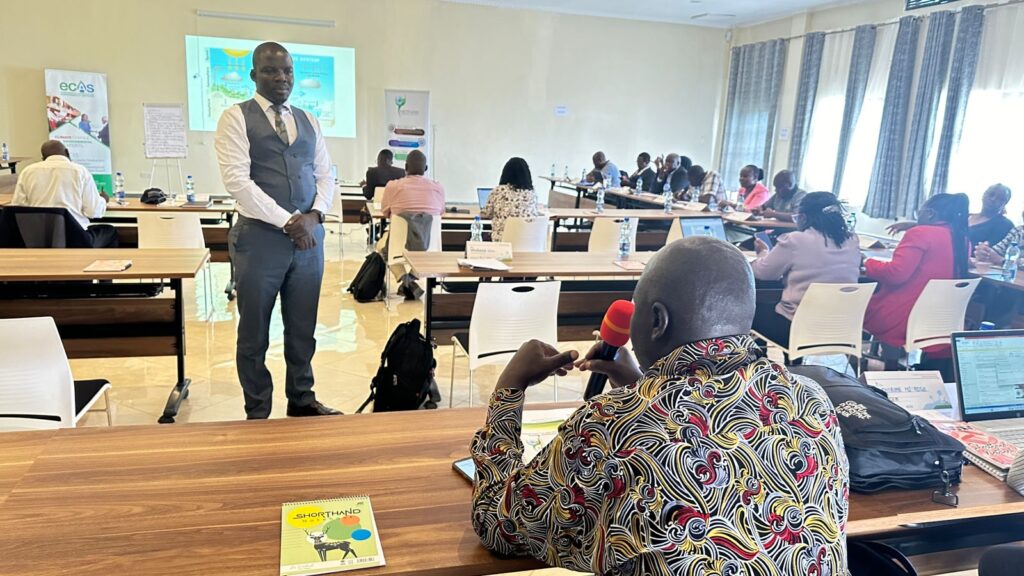
CONCEPT NOTE
INTERNATIONAL TRAINING ON BUSINESS PLANNING FOR AGRI-BUSINESS
COURSE BACKGROUND
In the context of increasingly competitive and resource-constrained rural economies, turning agricultural ideas into viable businesses requires structured planning and financial foresight. This course—“Business Planning for Agri-business”—is the third in a series of three e-courses designed to empower field technicians and rural development practitioners with practical skills to prepare investment-ready business plans using the RuralInvest software.
As part of ECAS Institute’s mission to build institutional and technical capacity across Africa’s agri-food systems, this course provides an essential toolkit for professionals supporting smallholder farmers, cooperatives, and rural entrepreneurs. ECAS combines regional insight with global tools to ensure participants are well-equipped to drive sustainable agri-business growth and investment.
COURSE OBJECTIVES OF THE TRAINING
This training aims to:
- Equip participants with the ability to convert agri-business concepts into full business plans using RuralInvest software.
- Strengthen participants’ capacity to analyze investment feasibility using standard financial indicators.
- Enable users to interpret Internal Rate of Return (IRR) and Net Present Value (NPV).
- Develop skills in assessing risk and conducting incremental and sensitivity analysis.
- Familiarize users with collaborative features and configuration settings of the RuralInvest platform.
WHAT YOU WILL LEARN
By completing this course, participants will be able to:
- Develop comprehensive business plans for agri-businesses using RuralInvest software.
- Explain and interpret key financial indicators such as IRR and NPV.
- Understand various financing options for agribusiness ventures.
- Perform incremental and sensitivity analyses to assess financial robustness.
- Configure Rural Invest software settings and manage collaborative workflows.
DURATION AND PROGRAM
TARGET PARTICIPANTS
This course is designed for practitioners and professionals involved in agricultural development and rural investment. Ideal participants include:
- Field technicians and extension agents
- Financial institution representatives and rural finance officers
- Staff from international development organizations and donor-funded projects
- Business planning consultants and agri-financial analysts
- Faculty members and students of agricultural training institutions and universities
TRAINING MODULES
| No | Module | Details | |
| 1. | Business Plan – Basic Concepts and Purpose |
This module introduces foundational concepts in agri-business planning, emphasizing the role of business plans in securing finance, managing operations, and guiding rural investments.
Topics:
|
|
| 2. | Creating a Business Plan with the Software |
Participants will gain hands-on experience in building a business plan from scratch using RuralInvest.
Topics:
|
|
| 3. | Additional Analysis – Incremental and Sensitivity Analysis |
This module covers how to assess the feasibility and robustness of business plans under varying scenarios.
Topics:
|
|
| 4. | Configuration and Administrative Functions |
Learn how to customize the RuralInvest software for institutional or project-specific needs, and how to collaborate with other users.
Topics:
|
|
TRAINING STYLE
The modules will be taught through PowerPoint presentations, and lectures and will include a case study/field visit, breakout sessions, case studies and other interactive discussion components.
The course will also include a few guest speakers, both in person and via Zoom and other online learning platforms for overseas speakers. This provides useful real-world insights alongside the more theoretical aspects of the course.
The conference faculty shall consist of experienced decision makers, as well as practitioners and representatives from established educational and research institutions active around climate change, engineering and international development. Throughout the course, theoretical presentation of concepts will be moderated and more group discussions and plenary engagements will be optimized. PowerPoint presentations will be made by facilitators and resource persons, to highlight key concepts before embarking on group work.
GENERAL NOTES
- Training manuals and additional reference materials are provided to the participants.
- Upon successful completion of this course, participants will be issued with a certificate.
- We can also do this as a tailor-made course to meet organization-wide needs. Contact us to find out more: info@ecasiafrica.org.
- Payment should be sent to our bank account before the start of training and proof of payment sent to: info@ecasiafrica.org.
ABOUT ECAS INSTITUTE
The ECAS Institute designs and delivers independent and targeted training, research, and consulting services. Our work focusses on climate change and resilience building, carbon markets, renewable energy, nature-based solution, biodiversity conservation, agriculture and food systems, We are located in Nairobi Kenya and work across the African region. We have implemented training and research assignments in Kenya, Tanzania, Uganda, South Sudan, Somalia, Malawi, Rwanda, Congo, and South Africa. Globally, we have supported our partners from the UK, Denmark, Italy, Sweden, Germany, and USA.

